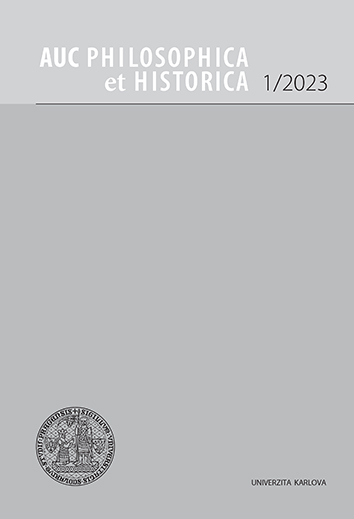AUC Philosophica et Historica (Acta Universitatis Carolinae Philosophica et Historica) is a multidisciplinary academic journal focused on the humanities with more than 50 years of tradition.
The journal is indexed in CEEOL, DOAJ, and EBSCO.
AUC PHILOSOPHICA ET HISTORICA, Vol 2009 No 1 (2009), 107–120
Totální město
Václav Cimbál
DOI: https://doi.org/10.14712/24647055.2018.15
published online: 12. 01. 2018
abstract
At present, more than 50% of the world population lives in towns. As a result, the town has become the predominating type of the human environment. This change raises many urban, architectonic, demographic, traffic, energetic as well as cultural-symbolic questions – the questions connected with the relationship of the man and the world as a whole. The man is an indivisible unity of body and consciousness; the contents of the consciousness are thus given also by the bodily experience of the physical world. In the first part of the text, the author deals with the ways of the human relation to this world (space), origination of the basic spatial schemes and orientation in the space. The author presents a thesis that the nature is an account of the depths of the being and that the relationship between the cosmos and the human spirit, the relationship, which serves as a matrix for mythology, arts, philosophy and science, has been seen from the morning of the human existence. In this article, the author examines how the spatial awareness is related to the character of the artistic, religious and rational grasp of the intuitively perceived order of the cosmos. In the next part, the author studies the urban environment as an organism created by gradual snowballing and development of its structures. The author studies their development from the moment when towns represented the human environment for an insignificant part of the population only and when the people maintained a close link to the natural/rural environment, up to the present. Now it is typical that the town is the human environment for more than half of the world population, and the society has been thus physically and culturally separated from the natural world. As a consequence, the relationship with the natural world has been being replaced by the relationship with other cultural layers. This situation raises questions whether such closed culture may perform its typical functions, whether a system of values can be restored, or whether it is a formal, auto-reference system incapable of giving answers to the basic questions of the human existence. The author shows that the artificial technical environment serves as a background for solving both living and existential issues in many works of the mental civilisation. However, he shows that in order to solve them, it is necessary to overcome the technology as a world-governing phenomenon and subordinate it again to the sphere of values as a source of private and social standards of action.
